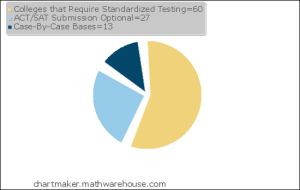Ah, testing- an inevitable and dreaded part of every student’s academic career. And the two tests that seem to stress out high schoolers the most at some point or another? Many would say the SAT and/or ACT. Both tests are important pieces of information that are taken into consideration during the college acceptance process, so what’s the difference between the two? Do more colleges accept one and not the other? Can you take one and not the other? In that case, which one should you take? And how important are they really?
Though both essentially have the same purpose- assisting in the college acceptance process- there are a couple big differences between the two. When Mrs. Haverkamp, the “college and career liaison” at Leonardtown was asked what the main difference was between the two, she said that, “The ACT has a science component that the SAT doesn’t. So if you we’re interested in a career in the medical or engineering field, this would be the test that you would want to take.” The Princeton Review Assessment (PRA) was created to help students decide which test is best for them, listing the key differences between the two. According to the PRA:
- The ACT questions are normally more straightforward when compared to the SAT questions.
Ex.
- SAT Essay- What is your view of the claim that something unsuccessful can still have value?
- ACT Writing Test- In your view, should high schools become more tolerant of cheating?
- The SAT has stronger vocabulary emphasis.
- Though the ACT doesn’t require students to take the writing section, most colleges will require it.
- Both tests include math sections, but the ACT tests up to trigonometry while the SAT covers math concepts up to geometry.
- The ACT is broken up into chunks by subjects, with the writing portion at the end; the SAT content areas are broken up into 10 sections, the required writing at the beginning.
- College admission officers will look at how you did on each section of the SAT, while on the ACT the overall score is looked at. (So if you did poorly in one area on the ACT, you can still receive an overall ACT score.)
With these in mind, students can look at the differences and decide which to take. Mrs. Haverkamp told us that the college admission test that used to be taken more in this area (and the state of Maryland in general) was the SAT. However, she said the ACT was taken more nationwide last year, mostly due to the easier-to-understand wording of the questions. A Washington Post article shows that 1,666,017 students took the ACT in 2012; while 1,664,479 students took the SAT, making it the first year that the ACT overtook the SAT as the most popular college entrance exam. Because of this, the SAT is actually planned to get a revamping. “By 2015, there will be a whole new SAT”, Mrs. Haverkamp shared.
If you’ve decided which test to take, you may want to see what schools look at before tearing your hair out over your scores on the test. From looking at 15 Maryland colleges, 60% of them require standardized testing when submitting a college application. 27% of schools have a “SAT/ACT Optional” policy. That’s not to say that it doesn’t help to submit your scores, just that they aren’t required to submit an application. And 13% are more of a case-by-case bases, sometimes depending on what you’re applying with or what your average GPA is.
But don’t stress out too much over scores and numbers. While they are important, nearly all schools also take into account extracurricular activities, high school grades, and recommendations. So whichever test you do choose to (eventually) take, don’t overstress yourself about it. Compare the two and decide which test would be best for you. Then do what you can to prepare, don’t worry about it more than you should, and do your best!









